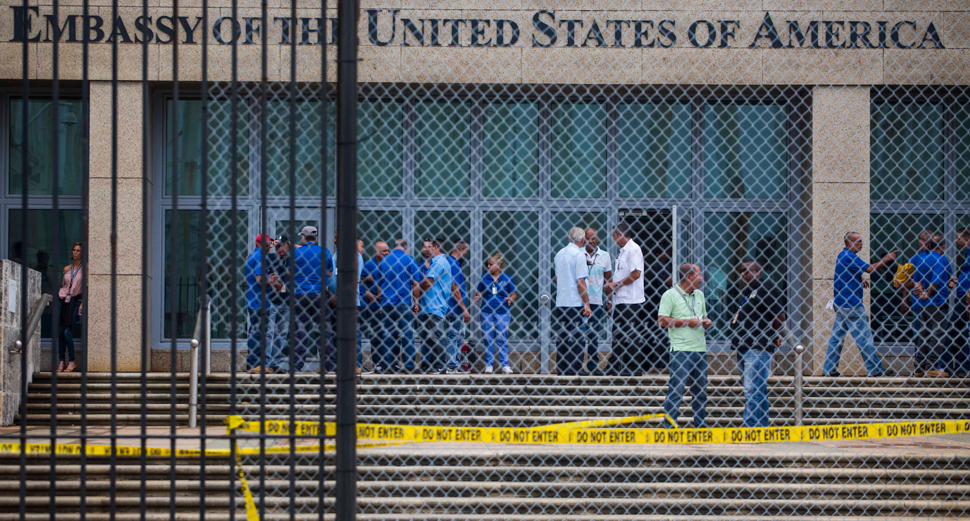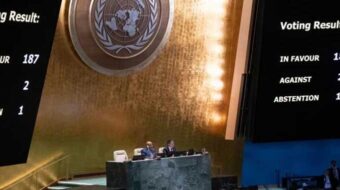
A big element of the U.S. government’s renewed hostilities against Cuba is manipulation of travel to and from the island. Travel restrictions, serving U.S. policies of economic blockade, deprive Cubans and their government of money U.S. visitors would otherwise be spending.
The Obama administration had restored the “people-to-people” visitor program of the Clinton administration. Americans once more were visiting Cuba easily and legally. They did so in groups, shepherded by licensed travel agencies, and as individuals. Assurances for U.S. border officials that they were traveling for humanitarian, cultural, educational, religious, or journalistic purposes qualified them for a “general license”—and without paperwork.
Travel changed in other ways and in both directions. Cuba’s government no longer required exit visas for citizens leaving the island and had enabled those living abroad easily to return briefly or permanently. Cubans arriving in the United States without papers lost guarantees of permanent residence there. Bob Guild, vice-president of Marazul Tours, recently told this writer that at the end of Obama’s presidency he could envision normal travel. Indeed, More than 615,000 Americans visited Cuba in 2017, up from 285, 000 in 2016.
The Trump Administration on June 16, 2017 announced tightened restrictions, which took effect in November. No longer would individuals travel alone; they have to join a group organized under the people-to-people program, which survives. Tour organizers must fully document that their clients travel for acceptable reasons and that they interact with Cubans. Hotels and other tourist services operated by Cuba’s military were to be avoided. A list was provided.
But new regulations alone wouldn’t work to reduce the flow of U.S. visitors by very much. Enforcement of restrictions has ranged from sporadic to non-existent. Enforcement now is nil, reports Bob Guild, relying on anecdotal reports. Even so, far fewer U.S. visitors were arriving in Cuba at the end of 2017 than a few months earlier.
According to travel journalist Christopher Baker, writing in January, 2018, “Tour operators specializing in Cuba ‘people-to-people’ programs report that demand this winter is down about 80 percent.” That month, he had “witnessed first-hand that U.S. travelers in Cuba are now thin on the ground, while B&Bs and paladares (private restaurants) that last year were overflowing with American travelers are suddenly begging for business.”
What happened? U.S. travelers are indeed responding to fear, but not fear of punishment. Rather, they are afraid of threats to their health and safety. Travel warnings from the U.S. State Department fanned their fears.
The Department declared September 29 that “numerous U.S. Embassy Havana employees have been targeted in specific attacks.” Said the embassy, “We believe U.S. citizens may also be at risk and warn them not to travel to Cuba.” Similar warnings were issued October 6 and again on January 10, 2018.
Prospective travelers learned about the alleged attacks and sicknesses of U.S. embassy “employees” from the media and travel agencies. In November 2016, personnel reportedly began experiencing hearing loss, dizziness, balance problems, headaches, fatigue, thinking problems, and/or insomnia. Victims included 24 U.S. employees and up to eight Canadian counterparts.
As the news spread in August 2017, U.S. officials anonymously attributed the symptoms to a “covert sonic device.” Without accusing Cuba of carrying out the attacks, the government declared its personnel and visitors to be unsafe there. The Department soon brought 60 percent of its embassy staff home and, to punish Cuba for not protecting U.S. personnel in Havana, expelled 15 Cuban diplomats from Washington. A few weeks later, President Trump did blame Cuba for the attacks.
U.S. actions taken in response to the attacks and illnesses radically altered travel to and from Cuba.
Cubans now find getting to the United States nearly impossible; there are no U.S. officials available in Havana to process applications for entry visas. An understaffed Cuban embassy in Washington is hard put to provide consular services including special visas and entry documents for Cuban-Americans visiting relatives.
A pediatric surgical subspecialist, a friend of this writer, serves a wide referral area in eastern Cuba. On visits lasting weeks at a time, he had been honing his skills at a prestigious children’s hospital in New England. He was to have returned in February, but now his plans are on hold.
He writes that to obtain his visa he must go to the U.S. embassy in Bogota, Colombia. He would be surrendering his passport there and then waiting days or weeks at considerable expense for an appointment with an official.
Other Cubans share his predicament. They can’t visit family members in the United States, perform before U.S. audiences, see the sights, study, participate in academic conferences, or take up U.S. residence. That’s a big change since the first half of 2017 when 240,000 Cubans entered the United States.
Mechanisms used to alter U.S. travel to the island are clear. The consequences are too. But to appreciate the high-order scheming that may be involved, one needs to explore the many uncertainties.
Nobody has defined a syndrome accounting for the symptoms attributed to the U.S. embassy employees. Their names and the course and treatment of their illnesses remain unknown. Those afflicted apparently were intelligence operatives, not diplomats. Independent scientists reported that to harness sound waves to cause harm or an injury would have been impossible in locations where the victims lived. FBI teams visited Cuba four times to investigate the supposed attacks and found no cause. Hundreds of Cuban investigators also found nothing.
No foreign visitor to Cuba has experienced anything similar; 4.5 million tourists visited Cuba in 2017. No other nation has restricted travel to Cuba. Christopher Baker reports that, “On January 18, 2018, Cuba was named ‘Safest Country for Tourism’ at the 38th annual International Tourism Fair (FITUR), in Madrid, Spain… I’ve always considered Cuba to be the safest place in the Americas outside Canada.”
Travel industry representatives met January 12 with State Department officials. Bob Guild, one of them, later told a reporter, “We want more information about who the people were, how they were affected, how they are now,” adding that “No specific information was given to us.” In fact, “There’s no evidence about a sonic or any attack.”
Guild serves as co-coordinator of RESPECT (Responsible and Ethical Cuba Travel). The organization’s members are “travel agencies, tour operators, non-profit entities, and other travel service providers”—120 in all, plus 40 individuals. Formed in late 2016, RESPECT is in the forefront of resistance to the new barriers.
The group begins a statement of principles with: “We understand that the opportunity to visit Cuba is a step towards promoting mutual understanding and learning, through firsthand respectful exchanges, contributing to more informed, pro-active, and responsible global citizenship on the part of all concerned.”
RESPECT quickly rejected the State Department’s travel warnings as unwarranted. Co-coordinator Walter Turner declared that, “We fear that such hasty action by the Trump Administration, independent of scientific evidence, may be motivated by politics rather than concerns for health and wellbeing.”
Senator Patrick Leahy, D-Vt., looked at those politics. Commenting on reports of attacks and sickness, he asserted that, “Whoever is doing this obviously is trying to disrupt the normalization process between the United States and Cuba. Someone or some government is trying to reverse that process.”












Comments